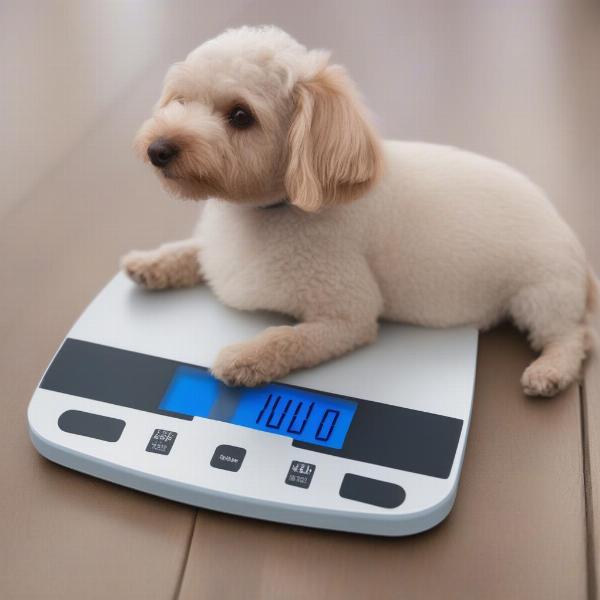Knowing your dog’s weight is crucial for their overall health and well-being. Whether you’re monitoring a puppy’s growth, managing a senior dog’s weight, or simply ensuring your furry friend is at their ideal size, accurate dog weight scales are essential. This guide will walk you through everything you need to know about choosing and using dog weight scales, helping you make the best decision for your canine companion.
From understanding the different types of scales available to practical tips on weighing your dog at home, we’ll cover it all. We’ll also discuss the importance of regular weight checks and how they can help you detect potential health issues early on. So, let’s dive in and learn how to keep your furry friend at a healthy weight.
Types of Dog Weight Scales
There are several types of dog weight scales available, each with its own pros and cons. Choosing the right one depends on your dog’s size, temperament, and your budget.
Digital Scales
Digital scales are generally the most accurate and easy-to-read option. They offer precise measurements and often come with features like a hold function, which is helpful for wiggly dogs. These scales are often portable and can be used at home or on the go.
Beam Scales
Beam scales are a more traditional option, using a sliding weight to determine the dog’s weight. They are typically less expensive than digital scales but can be less accurate, especially for smaller dogs.
Platform Scales
Platform scales are designed for larger breeds and can accommodate heavier dogs. They are typically very sturdy and durable, often made of metal or heavy-duty plastic. Some platform scales also have digital displays for easy reading.
 Digital Dog Weight Scales
Digital Dog Weight Scales
How to Weigh Your Dog at Home
Weighing your dog at home can be a challenge, especially if they’re not used to standing still. Here are some tips to make the process easier:
- Use positive reinforcement: Reward your dog with treats and praise for standing calmly on the scale.
- Start slowly: If your dog is hesitant, start by placing the scale on the floor and letting them sniff it. Gradually introduce them to standing on it.
- Use a familiar object: Place a familiar blanket or toy on the scale to make your dog feel more comfortable.
- Be patient: It may take several tries before your dog is comfortable being weighed.
Why Regular Weight Checks are Important
Regularly monitoring your dog’s weight is crucial for their health. Weight changes can be an early indicator of various health problems, including:
- Obesity: Obesity can lead to a host of health issues, such as joint problems, diabetes, and heart disease.
- Malnutrition: Sudden weight loss can be a sign of malnutrition or an underlying medical condition.
- Parasites: Intestinal parasites can cause weight loss, even if your dog is eating normally.
What to Do If Your Dog’s Weight Changes
If you notice a significant change in your dog’s weight, it’s essential to consult with your veterinarian. They can determine the underlying cause and recommend appropriate treatment. Don’t attempt to diagnose or treat your dog yourself.
Choosing the Right Scale for Your Dog
Consider these factors when choosing dog weight scales:
- Dog’s size: Make sure the scale can accommodate your dog’s weight and size.
- Accuracy: Choose a scale that provides accurate and consistent readings.
- Ease of use: Opt for a scale that is easy to read and operate.
- Portability: If you plan to travel with the scale, choose a portable option.
- Budget: Dog weight scales range in price, so find one that fits your budget.
Conclusion
Investing in accurate dog weight scales is an important step in ensuring your dog’s health and well-being. Regular weight checks can help you detect potential health problems early on and take appropriate action. By understanding the different types of scales available and following the tips provided, you can choose the right scale for your furry friend and make the weighing process as stress-free as possible. Remember, maintaining a healthy weight is essential for a long and happy life for your canine companion.
FAQs
- How often should I weigh my dog? It’s generally recommended to weigh your dog monthly or as recommended by your veterinarian.
- What is the best type of scale for a puppy? Digital scales are often the best choice for puppies due to their accuracy and ease of use.
- Can I use a human scale to weigh my dog? While you can use a human scale for very small dogs, it’s not ideal for larger breeds as it may not be accurate.
- Where can I buy dog weight scales? Dog weight scales are available at most pet stores and online retailers.
- How do I clean my dog weight scale? Clean the scale with a damp cloth and mild detergent. Avoid using harsh chemicals.
- What should I do if my dog is afraid of the scale? Start by letting your dog sniff the scale and gradually introduce them to standing on it. Use positive reinforcement and be patient.
- Are there weight scales specifically designed for veterinary clinics? Yes, veterinary clinics often use specialized scales that are designed for accuracy and ease of use with animals.
About ILM Dog
ILM Dog is your trusted source for expert advice on dog care, offering comprehensive information on breeds, health, training, nutrition, grooming, and much more. Whether you’re a new dog owner or a seasoned expert, we’re here to help you provide the best possible care for your furry companion. For expert advice on all aspects of dog care, from choosing the right breed to finding the perfect products, visit ILM Dog. Contact us at [email protected] or +44 20-3965-8624 for personalized guidance.